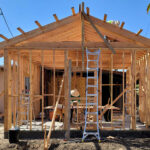When homeowners think about permits, they often associate them with regulatory approvals and compliance with building codes. However, a less recognized but equally important aspect of obtaining permits is their connection to home insurance coverage. In this article, we’ll delve into the often overlooked link between permits and home insurance, exploring how the two are intertwined and why homeowners should be mindful of this relationship.
- Permits as a Sign of Responsible Homeownership:
Insurance companies appreciate homeowners who prioritize safety and compliance. Obtaining permits for home improvements signals to insurers that you are committed to maintaining your property in accordance with local regulations. This responsible approach can translate into lower premiums and more favorable terms on your home insurance policy.
- Ensuring Coverage for Home Renovations:
When undertaking renovations or major home improvements, it’s crucial to inform your insurance provider. Failure to do so could result in coverage gaps. Some insurers may deny claims related to unpermitted work, considering it a breach of your contractual obligations. By securing the necessary permits, you not only comply with local regulations but also safeguard your insurance coverage in case of unforeseen events.
- Permits and Valuation of Property:
The valuation of your property by insurance companies takes into account various factors, including the quality and legality of home improvements. Unpermitted work may not be recognized in the assessment of your home’s value, potentially leading to underinsurance. This means that in the event of a covered loss, you might not receive adequate compensation for improvements made without proper approvals.
- Mitigating Liability Risks:
Home insurance covers not only property damage but also liability risks. Unpermitted construction work increases the likelihood of accidents, injuries, or damages that could result in liability claims. When you obtain permits, you demonstrate a commitment to safety and adherence to building codes, reducing the likelihood of incidents that could impact your liability coverage.
- Preventing Policy Voidance:
Insurance policies often include clauses that allow providers to void coverage if there is evidence of non-compliance with local regulations. Unpermitted renovations may serve as grounds for voiding your policy, leaving you financially exposed in case of a disaster. Avoiding such risks is as simple as obtaining the necessary permits before commencing any significant home improvement project.
- The Ripple Effect of Non-Compliance:
Non-compliance with permit requirements can create a ripple effect. If your home undergoes an inspection, and unpermitted work is discovered, not only could it impact your insurance coverage, but it may also lead to fines, mandated corrections, or even legal action. By proactively obtaining permits, homeowners can mitigate these potential consequences.
Conclusion:
While the connection between permits and home insurance coverage may not be immediately apparent, it is a crucial consideration for homeowners. By recognizing and respecting this link, you not only demonstrate responsible homeownership but also ensure that your property and investments are adequately protected. The seemingly bureaucratic process of obtaining permits can have a profound impact on the security and coverage of your home, making it an essential step in any homeowner’s journey.



